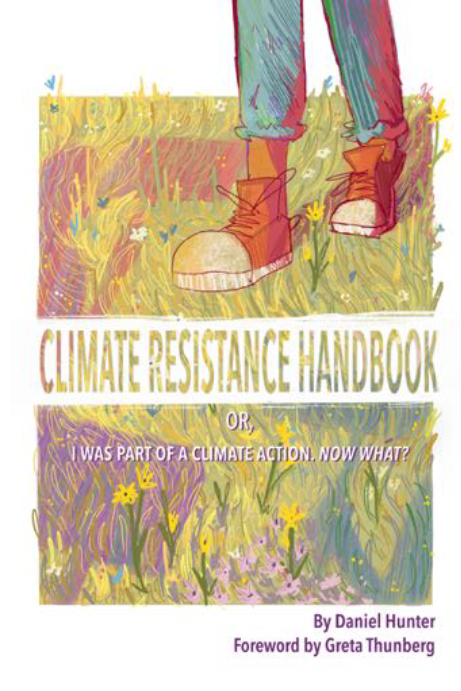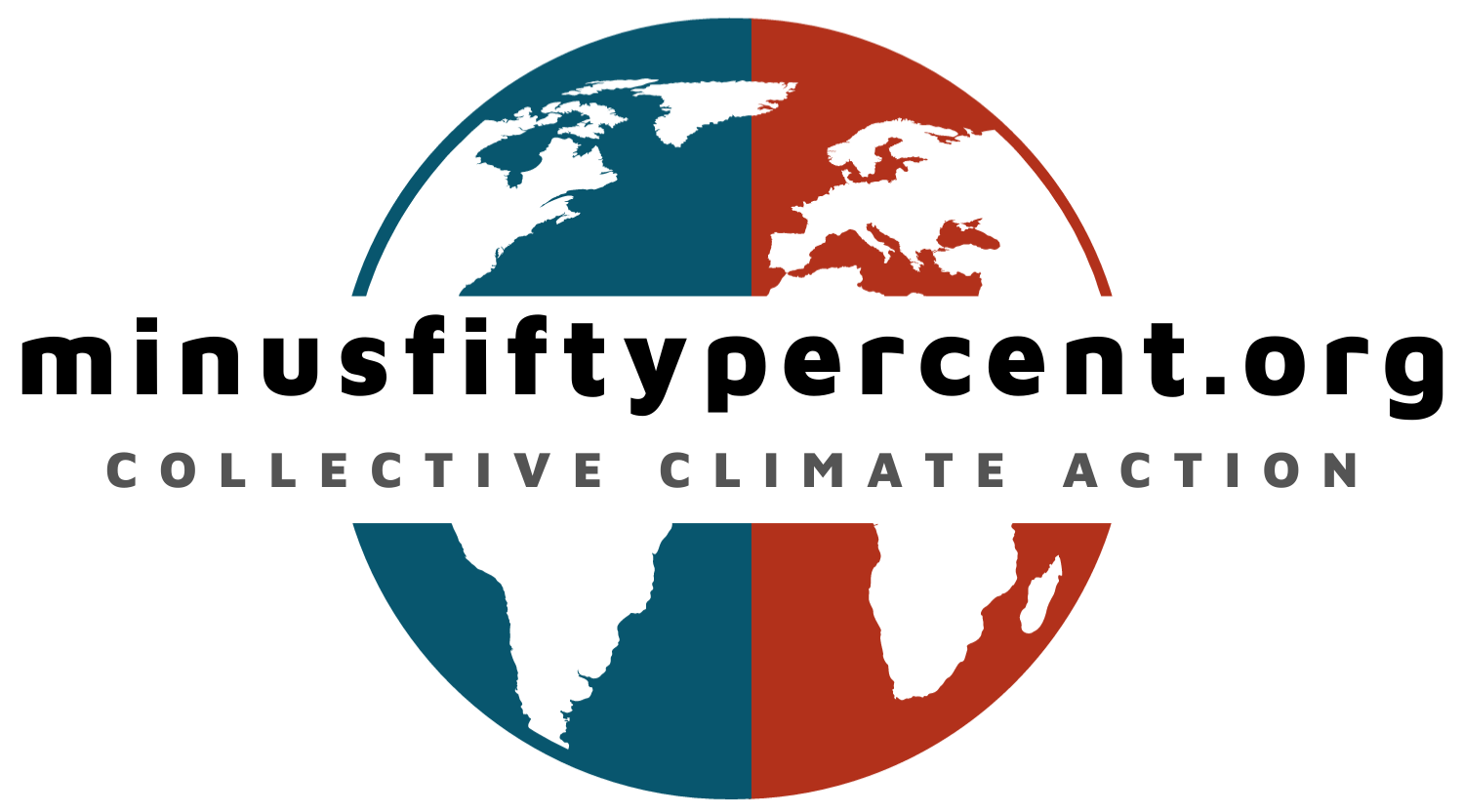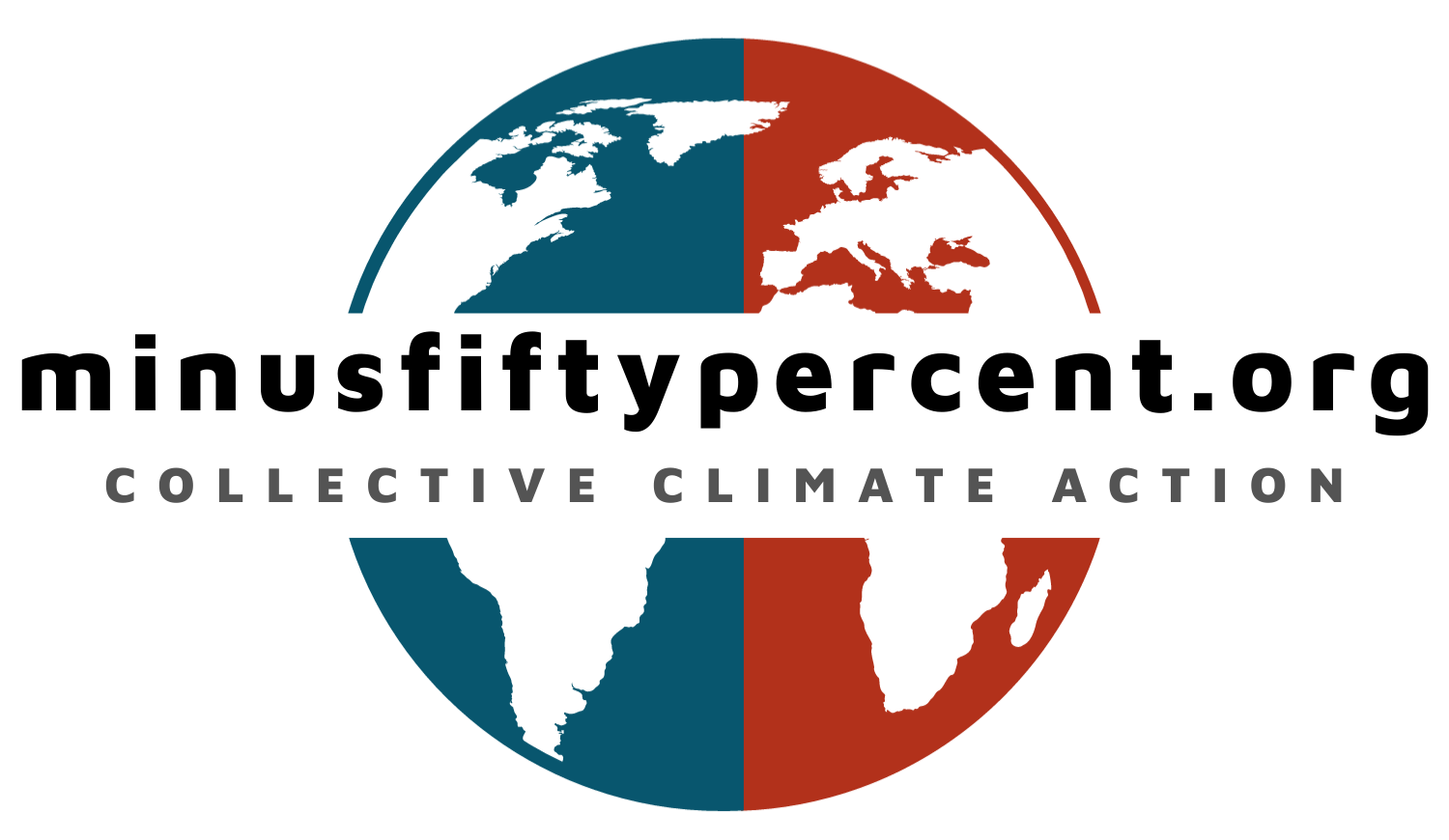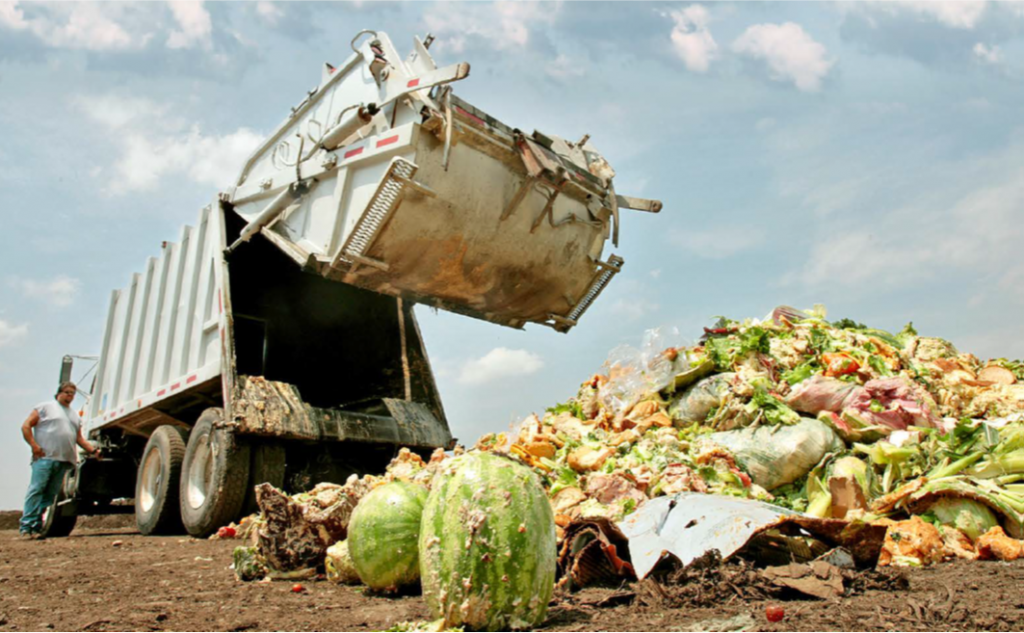Now there are words and intentions and there are actions. What our planet needs right now are our actions. No more words, no more waiting. We need to start reducing our climate-damaging behaviors. Individually and collectively.
Here are the 5 major categories that we need to start making minusfiftypercent reductions and one to do more of – climate activism:
> Travel
> Energy Consumption
> Food
> Consumerism
> Social Transformation
> Climate Activism
The simple summary: drive less, fly less, buy less, eat less red meat, use less energy, screen less, AND STEP UP YOUR CLIMATE ACTIVISM.
less = minusfiftypercent!
The natural world and its human made systems represent a complex adaptive system. There are dependencies between these categories above that cannot always be predicted. Life, environmental systems and economies, local and global, are operating in a dense matrix – start pushing hard on one end leaves predictions what will happen on the other end often worthless.
If, for example, a large number of people decides to reduce their air travel by fifty percent (-50%), as seen during the start of the COVID-19 pandemic, what are the foreseeable consequences: less planes, less fuel, less airport supports = less energy/electricity, less people employed in this industry, eventually less airlines; further consequences are less production of planes (less resource extraction), no more airport extensions (less energy, less construction), decrease electricity use (no hydroelectric dam expansions) etc. But also, less employment, less taxes, loss of businesses. If applied globally, the effects and consequences are also global in nature.
On the bright side what were the impacts for the people who reduced their travel? Well, a few less pleasure flights to visit family/friends or exotic places and less dreaded business flights to boring gatherings that could be done virtually anyway. Minor inconvenience for the individual, yet GHG emissions in unprecedented amounts are not put into the atmosphere; directly through less burning of kerosene and indirectly by less energy consumption through industry, production and construction.
Another example regarding food: let’s assume a large number of people start reducing their beef consumption by fifty percent. A ripple effect through the entire food industry will happen, from ranchers to finishing feed lots to slaughterhouses, packaging, transport, and retail, with many casualties along the way (farmers, minimum wage meat packaging jobs, trucking). Livestock production accounts for 70 per cent of all agricultural land use, occupies 30 per cent of the planet’s land surface and is responsible for 18 per cent of greenhouse gases such as methane and nitrous oxide. Growing animals for food is also inefficient. It takes about five to seven kilograms of grain to produce one kilogram of beef. Each of those takes energy and water to produce, process, and transport (source DSF).
The benefits are significant reductions in GHG emissions from cows, less energy use, less transport (cows & packaged meat), less use of agricultural chemicals (synthetic pesticides and fertilizers are often made from fossil fuels), less ground water pollution and improved human health (red meat consumption is correlated with colon and rectum cancer). Furthermore there are huge opportunities for local, small scale, high quality, humane and organic meat production choices. It is a minusfiftypercent, not an all-go-vegetarian scenario. Wise meat choices for the remaining 50% will increase the overall climate impact. Eat 50% less, help the climate, support your health and support small, high quality organic farms.
Our societies and economies are certainly not ready for those minusfiftypercent examples above, but our planet and climate is – and I would argue that also many of our societies are ready too. The question is whether we value personal choice, habits and convenience over a bright, non-suffering future for our children and all future generations. The changes are inevitable – we will need to adapt these changes, either by choice and intrinsic personal motivation now, or forced through government regulations (remember COVID-19 rules in 2020?), once the increasingly severe impacts of climate change – number and size of wildfires, floods, hurricanes, droughts, water shortages, crop failures, rising sea levels, mass migration and violent conflicts – are in everyone’s face – no denying anymore.
GHG = green house gas
TRAVEL
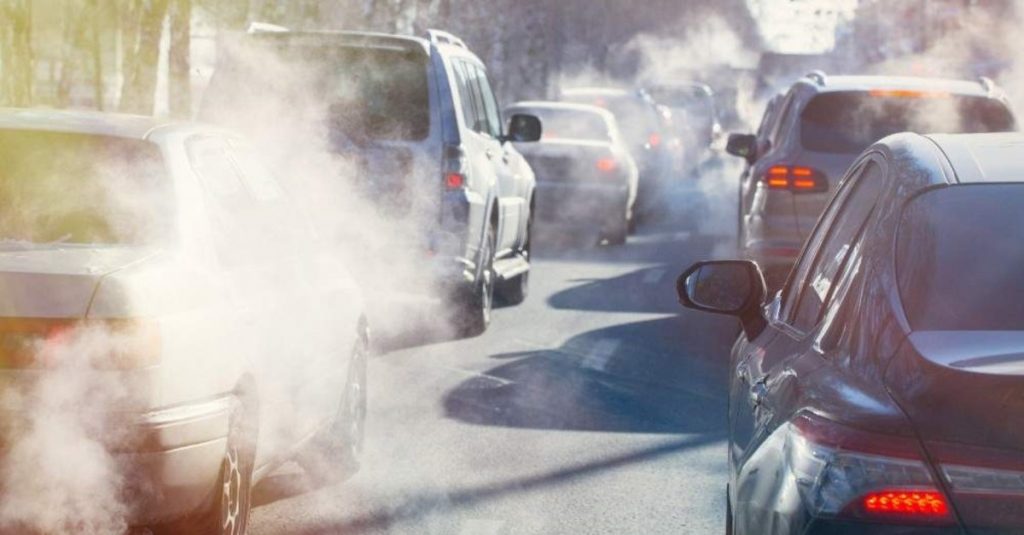
Transportation accounts for 14% of global GHG emissions. Greenhouse gas emissions from this sector primarily involve fossil fuels burned for road, rail, air, and marine transportation. Almost all (95%) of the world’s transportation energy comes from petroleum-based fuels, largely gasoline and diesel.
We all use fossil-fueled transportation; how can we reduce our use?
- Do you own more than 1 vehicle – reduce them by half, switch half to electric;
- Daily commutes – reduce and/or car pool, use public transport, bike, walk, e-bike;
- Flying frequently for work or pleasure – reduce it by half, use virtual meeting technology, reduce your pleasure flights;
- Are you using other fossil-fueled transportation, like boats, ATVs, dirt bikes etc – cut their use in half.
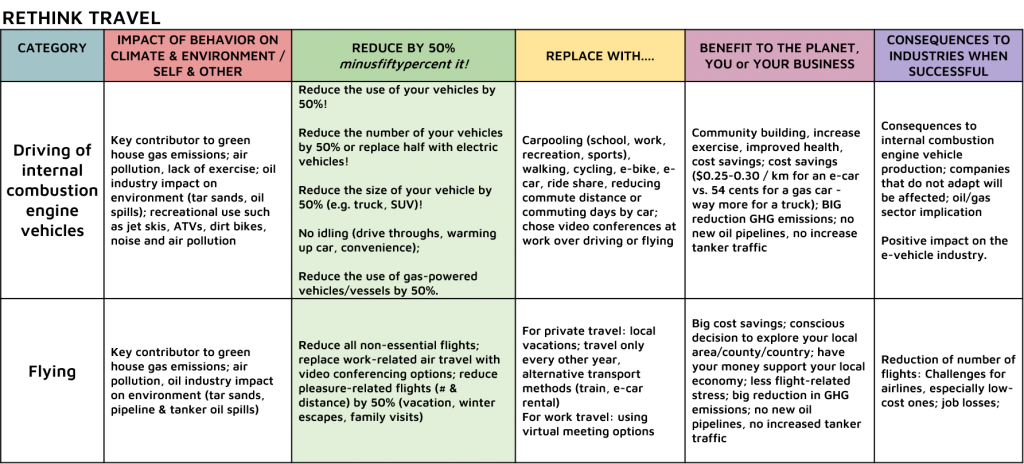
ENERGY CONSUMPTION
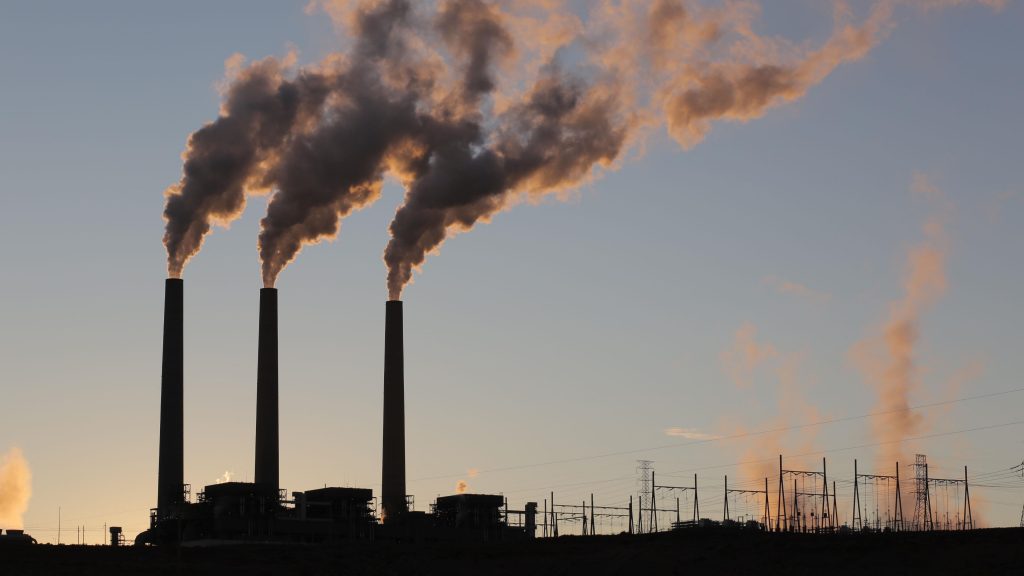
GHG emissions from Electricity and heat production (25%) and from buildings (6%) together account for 31% of global GHG emissions. GHG emissions from this sector primarily involve coal, natural gas, oil and wood/wood products burned primarily for electricity and heat production. 67% of global electricity generation comes from non-renewable sources (coal, natural gas, oil), 13% from nuclear and 20% from renewable sources (hydro, wind, geothermal, solar).
How can we reduce our use?
Reduce your energy consumption (heating, cooling) and your electricity consumption by 50%
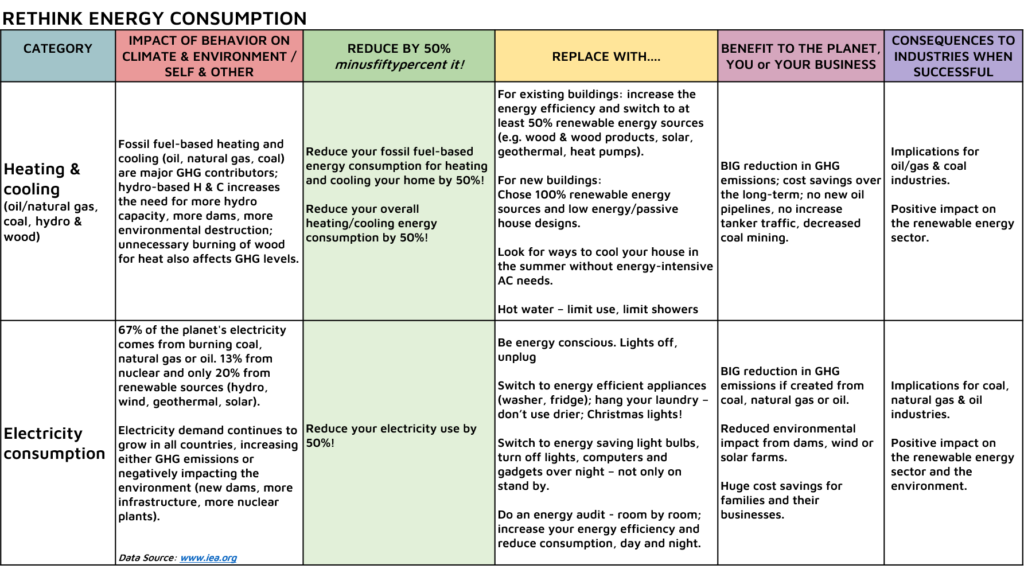
FOOD
Agriculture, Forestry, and Other Land Use account for 24% of 2010 global greenhouse gas emissions: GHGE from this sector come mostly from agriculture (cultivation of crops and livestock) and deforestation.
Global food waste (1 billion tons annually!) accounts for 8% of global GHG emissions.
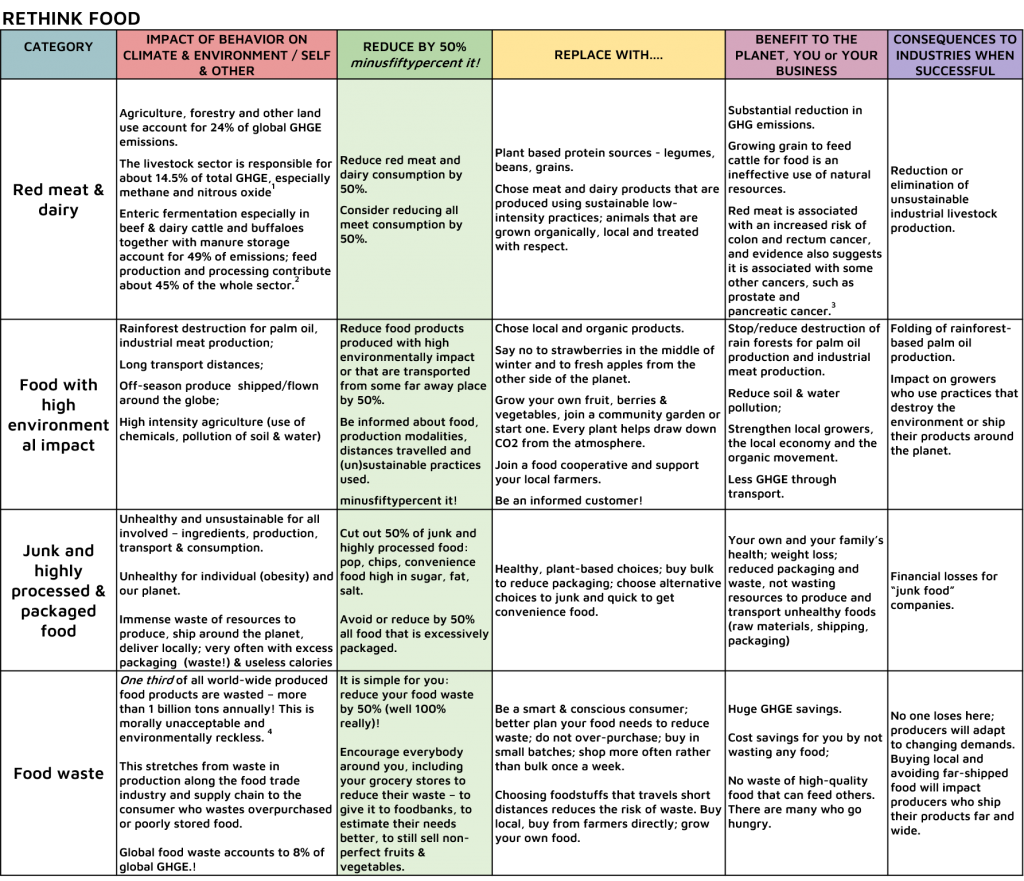
2 https://academic.oup.com/view-large/figure/198779975/vfy03402.jpeg
3 https://progressreport.cancer.gov/prevention/red_meat
4 https://www.wwf.de/fileadmin/fm-wwf/Publikationen-PDF/WWF-Bericht-Lebensmittelverschwendung-Halbierung-bis-2030.pdf GERMAN
CONSUMERISM

Every single piece we purchase has a climate impact. It needs raw materials, energy to manufacture, packaging, storage and transport. Some products and consumer habits are worse than others; more resource and energy intensive; online ordering & shipping; thoughtless consumerism.
All purchases of new things need to be reduced; examples include “fast fashion” (textiles never worn or thrown out almost immediately), the need to own the newest electronic gadget culture (having the latest phone, smart watch, biggest TV) and the use of one-time use items (single use plastics, shopping bags). It goes further to cars, boats, houses and planes for the super rich.
Online shopping is easy – a few clicks and everything will come in the mail; overly packaged to withstand transport, flown around the globe to arrive withing 36 hours. And returned (re-packaged and flown back) if it is not meeting expectations, or perhaps was a lousy choice anyway. It is not sustainable. Reduce all new purchases by 50%. Reuse, share, accept inconvenience, control your urge to possess and show off the latest shiny thing.
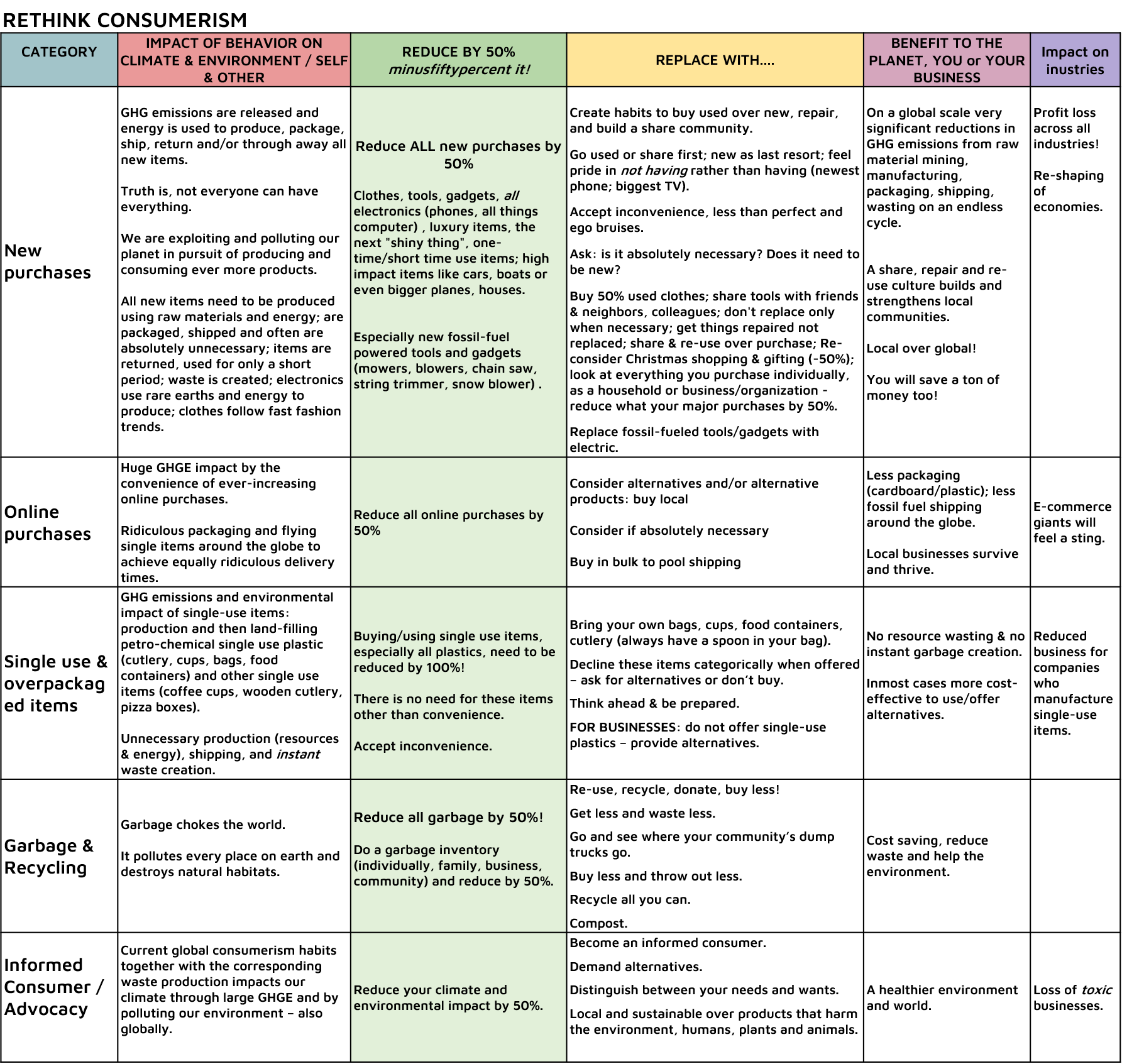
RETHINK SOCIAL TRANSFORMATION
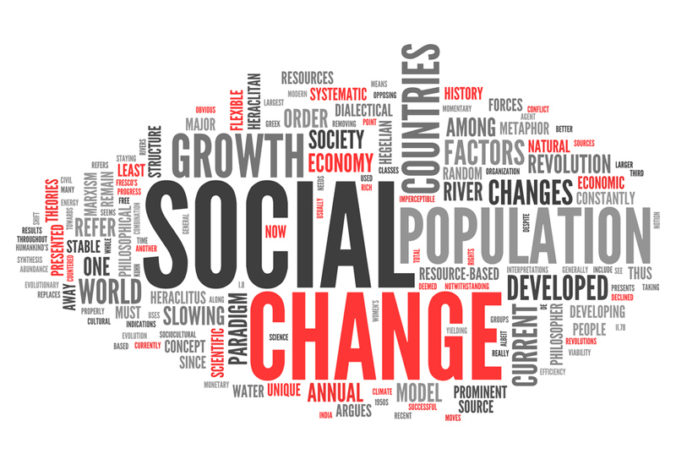
Positive impact on the categories listed above – travel, energy, food & consumerism – can hardly be achieved without an attempt for a global social transformation / renewal. Climate change is not a local challenge with no local solutions. Truly global in nature it needs a global change in habits and world views.
Not every person, not every country has the same ability and resources to make quick and lasting changes as summarized above. Some have more choices than others and some have no ability to change due to a lack of resources (poverty) and/or stress (trauma, war). We need to be very sensitive to individual abilities to make necessary changes and support all to make positive contributions to reduce our global green house gas emissions and environmental destruction.
In general, the wealthiest individuals and countries are contributing most to our changing climate; higher rate of GHG emissions, bigger energy needs, and consuming more. They need to act first and in the deepest way but no one is exempt to add their contributions!
There are social and cultural aspects that drive GHG emissions, environmental destruction and pollution. First and foremost a dissociation of individuals from the natural world; what you don’t know and value, you don’t protect. The predominance of screens and the many associated features/pleasures reduce the world to an artificial plane. Social media, games, online/computer work keeps us indoors and disconnected from nature. Striking levels of poverty (individuals and nations), the steady increase of mental health and substance use challenges, together with chronic stress and a lack of a spiritual connection or meaning drive our societies towards this fast approaching bottle neck of climate crisis and environmental destruction.
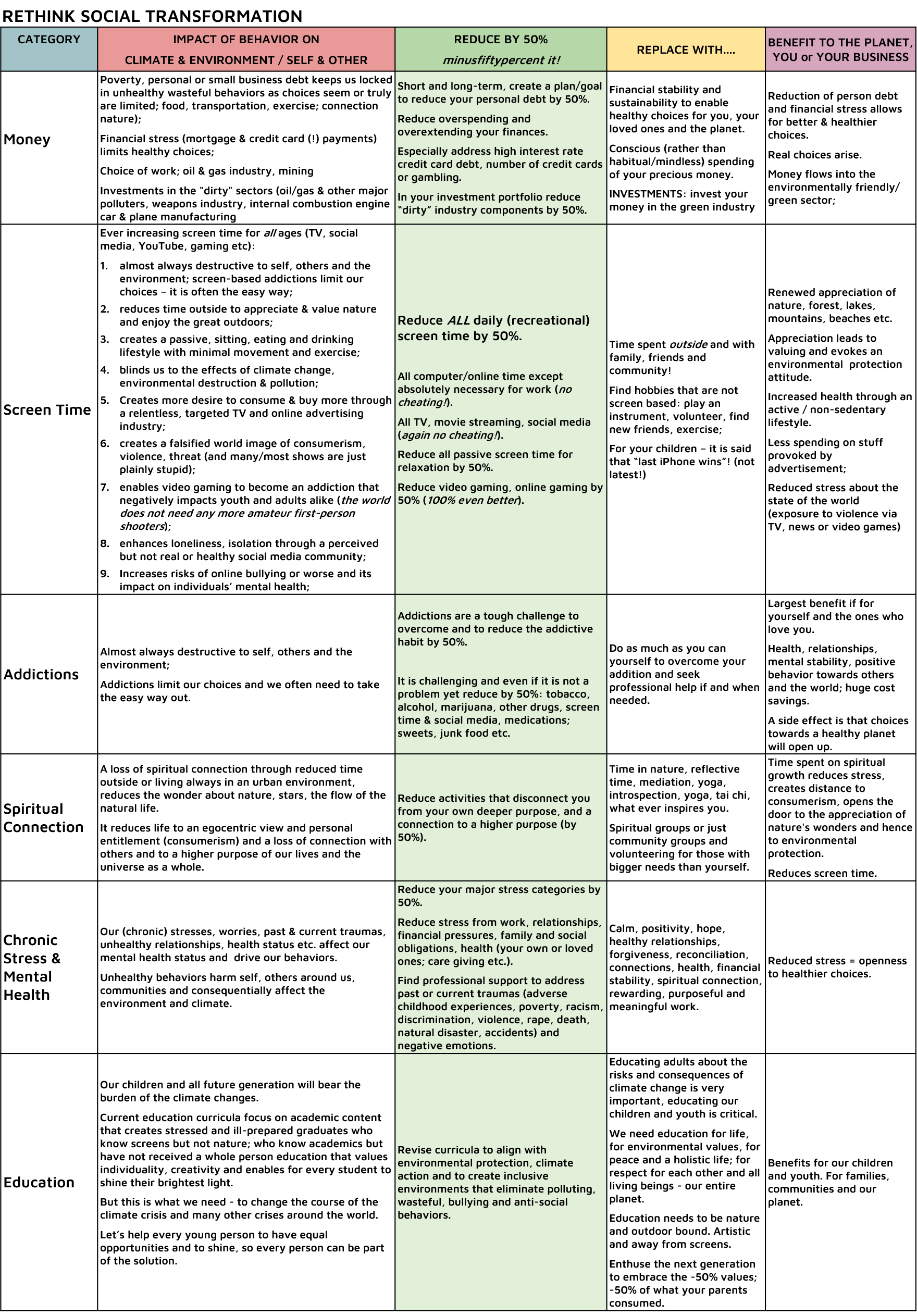
RETHINK CLIMATE ACTIVISM
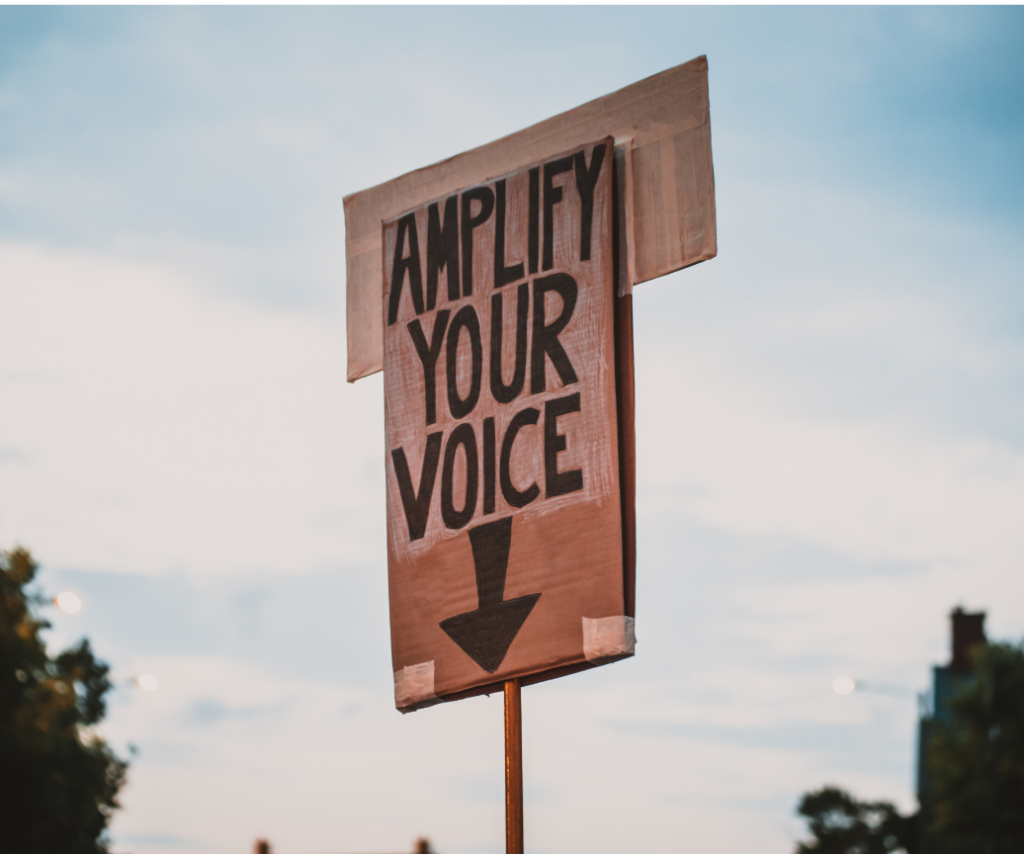
For a long time, I thought that we can win the climate change challenge with our individual actions alone; set examples, be a model for others, show the way through personal action. That we don’t need the governments, as they were sitting idle for 26 COP years anyway. If governments don’t change, we the people can do it. A talk by Seth Klein about this book “A Good War; Mobilizing Canada for the Climate Emergency” changed my mind entirely. He answered my question about individual, voluntary climate actions with: the scope and speed of necessary changes and emission reductions can not be accomplished with voluntary actions by us concerned citizens. Governments needs to enter into a true emergency mode and we the people need to pressure them into it.
If you start looking you will find tons of opportunities to get active and to support local, provincial/state or federal climate actions. Here are a few pointers:
David Suzuki Foundation – Take Action
Climate Emergency Unit – Take Action
